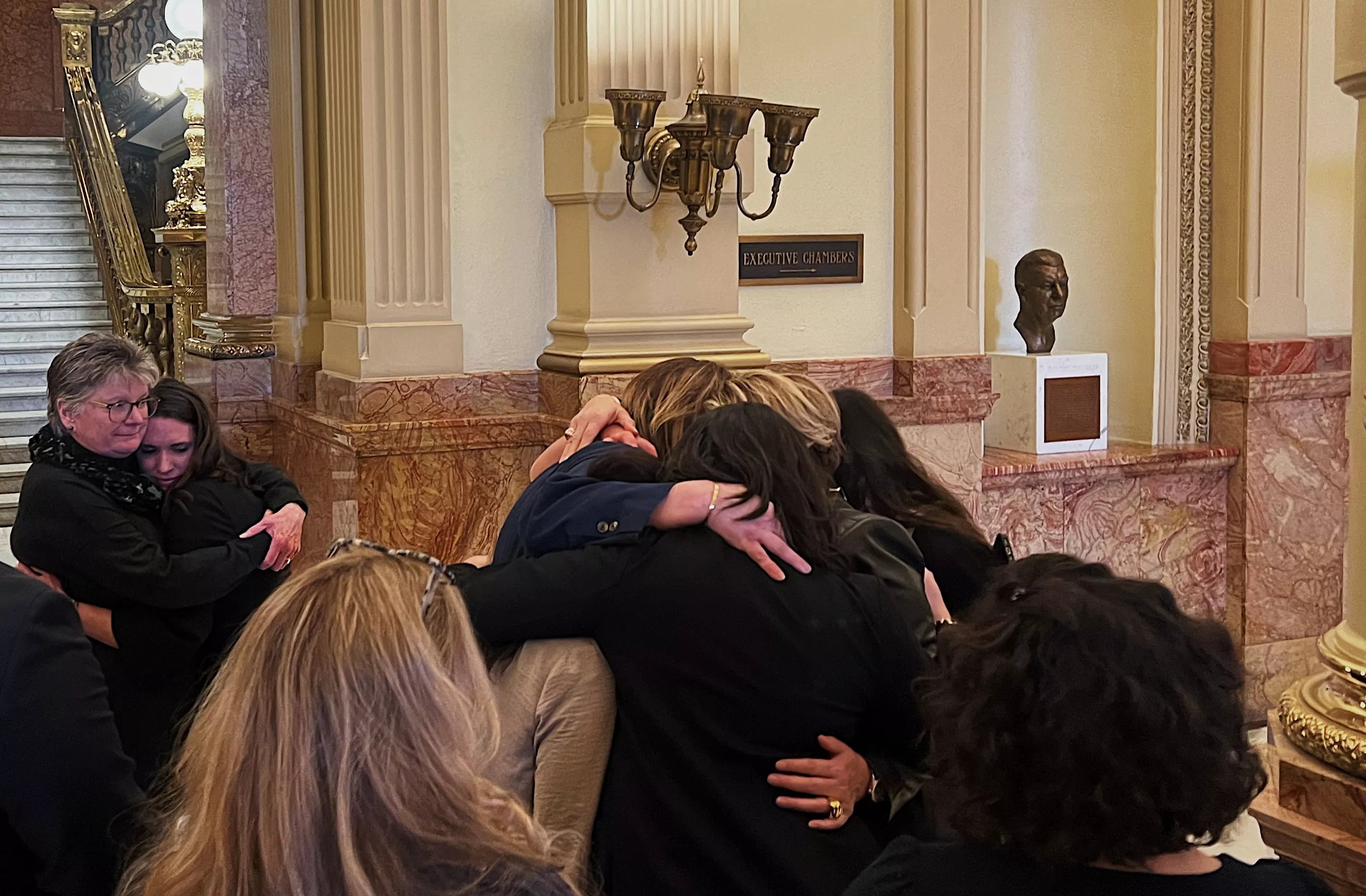
Hannah Metzger

Audio By Carbonatix
Nearly 7,000 people have reported being sexually assaulted as passengers or drivers of the Lyft rideshare platform, according to the company’s safety reports.
Colorado Representative Jenny Willford is among those thousands of victims. But she wants to be the last.
“I don’t wish my experience on anyone,” Willford said during a press conference on Tuesday, January 14. “The idea of saying out loud what happened to me made me sick to my stomach…but I have a platform that most people do not have and a daughter to raise in this world. That’s why I am here.”
Willford filed a lawsuit against Lyft on January 13, arguing that the company fails to take reasonable steps to prevent the sexual assault of its passengers, including ensuring that unauthorized individuals do not pose as drivers for the platform.
Willford took a Lyft to her Adams County home in February after spending time with friends. Shortly after the ride began, Willford says the driver started making sexual comments, asking if she was married and insisting her husband “wouldn’t mind if [they] had sex.”
Willford says she texted her husband and neighbor for help and took off her heels, preparing to run when the vehicle pulled up outside of her house. But the driver quickly blocked her exit, she claims, pushing Willford back inside the vehicle before sexually assaulting her.
“I don’t know how to put into words how excruciating it was to be so close to home, so close to my husband and our two kids, and so close to safety, only to be assaulted in view of my house,” Willford said. “The PTSD has been crippling, robbing me of time with friends and family, impacting how I do my job as a state legislator, and changing the person I see when I look in the mirror.”
Willford says she reported the assault to Lyft, but the company only refunded her ride and promised not to connect her to the driver again, making no mention of whether he would be removed from the platform. She later learned the man was not a registered Lyft driver; a different person approved to drive for the platform had given the alleged assailant access to his Lyft account to drive for him, the lawsuit claims.
Lyft sent the following statement in response to the lawsuit:
“Safety is fundamental to Lyft, and the behavior described in this incident has no place in our society. We take reports of sexual assault very seriously, and when incidents such as these are reported to us, our trained team takes immediate action to investigate and works with local law enforcement so that appropriate actions can be taken. In addition, our Terms of Service strictly prohibit the impersonation of another person or entity, and such behavior can and does lead to a permanent ban from the platform.”
This is the latest of several sexual assault cases involving Lyft in Colorado. In October, Lyft driver John Pastor-Mendoza was convicted of kidnapping twelve women, sexually assaulting two and attempting to sexually assault seven others, targeting intoxicated passengers seeking rides home in Denver. In April, Lyft driver Shengfu Wu was sentenced to nine years in prison for raping a thirteen-year-old passenger in Aurora.
“How many more is it going to take before Lyft decides to invest…a little bit into safety to make reasonable reforms?” Willford’s attorney, Stephen Burg, asked during the press conference. “This all could have been prevented.”
The lawsuit argues that Lyft drivers frequently share or sell access to their accounts to uncertified individuals who want to bypass background checks and work authorization requirements, but Lyft has failed to implement policies to stop the practice, such as fingerprint scans or random identity checks.
It also claims the man whose profile Willford’s alleged assailant used should not have been allowed to drive for Lyft, stating that he has a criminal history including child abuse, menacing and a traffic infraction.
Willford says she reported her assault to the police but, nearly a year later, she is still waiting on DNA test results before she can pursue criminal charges. The Colorado Bureau of Investigation has a massive backlog of DNA exams after it was revealed that CBI analyst Yvonne “Missy” Woods manipulated the results of over 1,000 DNA tests, requiring numerous cases to be retested. The turnaround time for rape kits is now more than 500 days.
Willford condemned the excessive wait time as “egregious and unacceptable,” saying the last year has been “a never-ending nightmare.” But she blames Lyft for the alleged assault happening in the first place.
“If Lyft had taken reasonable steps, Representative Willford – and hundreds and thousands of other people – would have never been assaulted,” attorney Morgan Carroll said during the press conference.
Willford is suing Lyft for negligence, violating the Colorado Consumer Protection Act, and defective product liability, among other claims. She is also suing Shanu Transportation LLC – a transportation company owned by the Lyft driver whose profile was used by Willford’s alleged assailant – for negligence, infliction of emotional distress, civil fraud and false imprisonment.
She is seeking compensation for economic and emotional damages, and a commitment from Lyft that the company will make changes to prevent the sexual assault of passengers and unauthorized driver profile sharing.